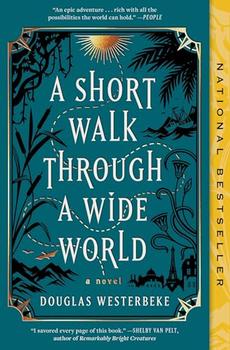Book Club Discussion Questions
In a book club? Subscribe to our Book Club Newsletter!
Please be aware that this discussion guide will contain spoilers!
Topics & Questions for Discussion
- Brainstorm some adjectives you would use to describe Aubry. What traits make her especially able to survive? Compare her to other characters in the book, like Marta, the Prince, Qalima, and Lionel. Is there a character who resonates strongly with you?
- The natural world is a core piece of A Short Walk Through a Wide World. What were some of your favorite descriptive lines evoking the landscapes Aubry traverses? How would the feel of the novel change if a majority of the plot took place on the streets of major cities?
- From the spider on the boathouse "reaching out into its little universe" (page 70) to Pathik's eagle, animals animate Aubry's travels. Can you point to any instances where an animal might be a metaphor for something Aubry confronts, or even for Aubry herself?
- Think back to the many slivers of Aubry's life Westerbeke offers—like lying on a beach with Yuki (page 142), dancing with the Navajo (page 246), or paddling by the crabs on Christmas Island (page 260). Out of these small departures, which one would you have liked to learn more about?
- In the first "Brief Aside," Aubry meets an old Chilean man who dislikes travel—a welcome change from the usual reaction to her illness (page 74). What do you think of the man's argument? What are your own personal opinions about travel?
- Can you think of certain passages where Aubry's gender seemed especially salient? What plot points might change if Westerbeke decided to write A Short Walk Through a Wide World with a male protagonist?
- How does the nonlinear structure of A Short Walk Through a Wide World affect your reading? What would happen to your experience of the book if Westerbeke decided to write the story of Aubry's life purely chronologically?
- On the riverboat with the Holcombes, Aubry tells Somerset that she has replaced the shaft and point of her spear several times. "Is it the same spear?" she asks him. "It looks the same. But I don't know. Is it the same spear? You tell me" (page 58). How does this moment relate to the "core of consciousness" motif to which Aubry returns (page 195)?
- In your opinion, which character most significantly impacts Aubry? This can be in an emotional, narrative, or philosophical context.
- Aubry's sickness rips her from her parents and sisters as a nine-year-old girl and forces her to spend decades with no lasting relationships. The last page of the novel suggests that Aubry has finally found a home with Vincente and his band of lost children. What is the role of childhood and family in A Short Walk Through a Wide World? How do these concepts motivate Aubry?
- How does Aubry's approach to life evolve over the course of the novel? What do her illness and the puzzle ball ultimately represent?
Enhance Your Book Club
- As a group, come up with a list of other "armchair travel" novels that you have read, and discuss how these selections differ from or are similar to A Short Walk Through a Wide World. What is gained from Westerbeke's approach? What about any films or other media that explore similar themes of adventure, self-determination, and the meaning of life?
- Pick a character Aubry meets in the novel and write a paragraph or two from their perspective. What do they think of Aubry initially, and what do they share with her? When she leaves, what feelings does she leave them with?
- Be like Marta and map out all of Aubry's travels. Have you been to any of the places Aubry has? Out of all her destinations, which are on your dream bucket list?
- Cast the A Short Walk Through a Wide World movie or miniseries: Choose your top picks for the main roles, and make a case to the larger group about who would best embody each character.
Unless otherwise stated, this discussion guide is reprinted with the permission of Avid Reader Press.
Any page references refer to a USA edition of the book, usually the trade paperback version, and may vary in other editions.
